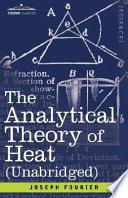
“Profound study of nature is the most fertile source of mathematical discoveries.”
Source: The Analytical Theory of Heat (1878), Ch. 1, p. 7

In this pioneering work of mathematics, Joseph Fourier shows how the conduction of heat in solid bodies can be analyzed in terms of an infinite mathematical series. Known as the Fourier Series, this was the first correct theory on heat diffusion and continues to be used in present-day analysis. For anyone interested in the theory of heat or in the mathematical tools developed by Fourier, this classic work remains indispensable. Born the son of a French tailor, JOSEPH FOURIER (1768-1830) was a mathematician, Egyptologist, and politician whose strong influence on mathematical physics continues to this day. His other works include Description of Egypt and Analysis of Determinate Equations.
“Profound study of nature is the most fertile source of mathematical discoveries.”
Source: The Analytical Theory of Heat (1878), Ch. 1, p. 7
Source: The Analytical Theory of Heat (1878), Ch. 1, p. 6
Context: If we consider further the manifold relations of this mathematical theory to civil uses and the technical arts, we shall recognize completely the extent of its applications. It is evident that it includes an entire series of distinct phenomena, and that the study of it cannot be omitted without losing a notable part of the science of nature.
The principles of the theory are derived, as are those of rational mechanics, from a very small number of primary facts, the causes of which are not considered by geometers, but which they admit as the results of common observations confirmed by all experiment.